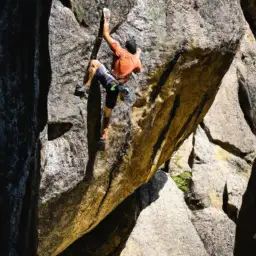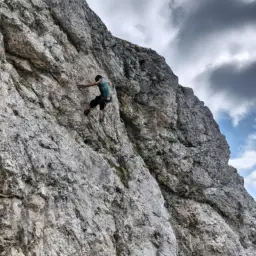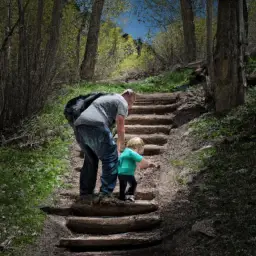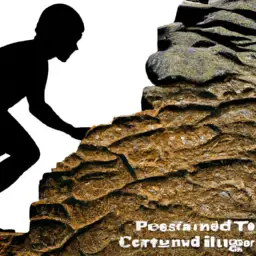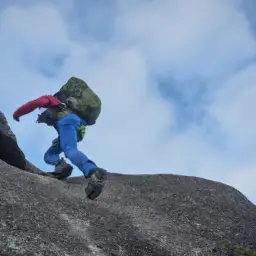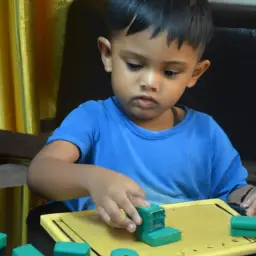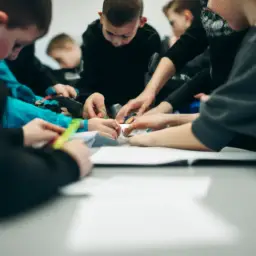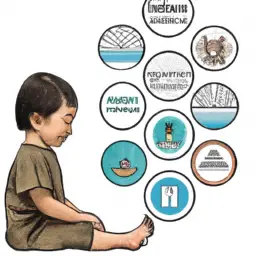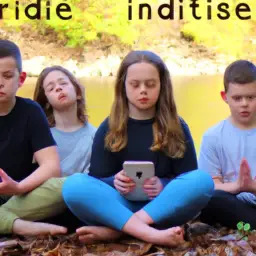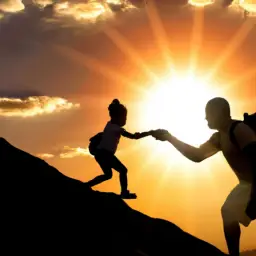Are you concerned about your child’s ability to persevere through challenges and setbacks? Do you want to provide them with an education that fosters resilience and determination?
If so, you may be interested in comparing forest schooling and traditional schooling in developing grit.
Grit is a trait that involves a combination of passion and perseverance towards long-term goals, even in the face of adversity. It is essential for success in various domains, including education, career, and personal relationships.
While traditional schooling focuses on academic achievement and standardized testing, forest schooling emphasizes hands-on learning and outdoor exploration.
By comparing these two approaches, you can gain insights into which one may be better suited for developing grit in your child.
Key Takeaways
- Forest schooling prioritizes experiential learning and hands-on activities, promoting physical activity and a healthy lifestyle, developing grit, resilience, and problem-solving skills, and providing opportunities for self-directed learning.
- Grit is essential for success in various domains, and forest schooling prioritizes its development through outdoor play and exploration, while traditional schooling may not provide enough opportunities for children to learn how to persevere through challenges and overcome obstacles.
- Educators should consider different learning styles when choosing an approach, with visual learners benefiting more from traditional schooling and kinesthetic learners thriving in forest schooling. Forest schooling can be adapted for remote learning through virtual outdoor experiences.
- Accessibility and affordability are critical factors to consider, with traditional schooling being typically free and inclusive efforts aiming to provide equal access to education for all students, while forest schooling programs may come with a cost and require a different level of parental involvement in terms of providing appropriate clothing and gear.
Defining Grit and Its Importance in Child Development
Grit is a crucial trait for children to develop, and it’s essential to understand its significance in their growth. Defining grit is a task that requires a deep understanding of what it means to persevere through obstacles, show resilience, and maintain a mindset of growth.
Children who develop grit are better equipped to handle challenges and setbacks, which are a natural part of life. They are more likely to take on challenges, set and achieve goals, and persist even when things get tough.
Child resilience is closely tied to grit, as children who are resilient are better equipped to handle life’s challenges. Resilience is the ability to bounce back from setbacks, and it’s an essential skill for children to develop.
Resilient children are better equipped to deal with stress, anxiety, and depression, and they are more likely to succeed in life. By developing grit and resilience, children can face the challenges of life with confidence and determination, which are essential for success in all areas of life.
Traditional Schooling Approach
In traditional schooling, you’re exposed to a structured learning environment which emphasizes academic achievement. The goal is for you to learn the necessary skills and knowledge to excel in standardized tests and meet the academic standards set by the school.
However, this approach may have limitations in developing grit, as it may not provide opportunities for you to learn how to persevere through challenges and overcome obstacles in a more unstructured and unpredictable environment.
Structured Learning Environment
Despite the potential benefits of a structured learning environment in traditional schools, forest schooling allows for a more flexible and student-led approach to education.
In a structured learning environment, students are often confined to a classroom and follow a strict curriculum, leaving little room for creativity and exploration.
In contrast, forest schooling provides outdoor learning opportunities and unstructured playtime, allowing students to learn at their own pace and in their own way.
Here are four reasons why a more flexible and student-led approach to education can be beneficial:
- It allows students to develop a sense of independence and self-reliance.
- It encourages creativity and problem-solving skills.
- It provides a more hands-on learning experience, which can lead to a deeper understanding of concepts.
- It allows students to learn at their own pace, which can increase motivation and engagement.
By incorporating outdoor learning and unstructured playtime, forest schooling provides a unique and effective approach to education that can help students develop the grit needed to succeed in life.
Emphasis on Academic Achievement
You may feel pressured to prioritize academic achievement in your education, but it’s important to remember that success in life involves more than just good grades. Forest schooling recognizes this and offers a different approach to learning.
Instead of solely focusing on academic pressure, forest schools prioritize the development of grit and resilience through outdoor play and exploration.
In traditional schooling, there is often a heavy emphasis on standardized testing and academic achievement. Students are taught to memorize information and regurgitate it on exams, rather than being encouraged to think creatively and critically. This can lead to a lack of motivation and a narrow focus on grades instead of personal growth.
In contrast, forest schooling prioritizes experiential learning and hands-on activities, allowing students to develop their own unique interests and skills. By taking a more holistic approach to education, forest schooling can help students develop grit and resilience that will benefit them throughout their lives.
Limitations in Developing Grit
Don’t ignore the fact that developing grit has its limitations, no matter how hard you may try. While forest schooling may provide ample opportunities for children to explore and engage with nature, it may not necessarily lead to the development of grit. There are challenges and drawbacks to consider when it comes to this aspect of education.
For instance, the lack of structure and routine in forest schooling may make it difficult for children to learn how to persevere in adverse situations. In traditional schooling, students are often given a set of tasks to complete within a given timeframe, which teaches them how to manage their time and prioritize their responsibilities. On the other hand, forest schooling may not have the same level of accountability, which could hinder the development of grit in some children.
It is important to recognize that while forest schooling offers many benefits, it may not be the best option for developing certain skills, such as grit.
Forest Schooling Approach
You’ll love how much more engaged and curious your child becomes through the freedom and hands-on learning of forest schooling. Unlike traditional schooling, where children are confined within the four walls of a classroom, forest schooling takes place in nature.
Your child will learn through outdoor learning, which provides them with a hands-on experience that allows them to explore and discover the world around them. Here are some things to look forward to with forest schooling:
-
Your child will have the opportunity to explore and interact with nature, which can help develop their curiosity and creativity.
-
They’ll learn essential life skills, such as problem-solving, decision-making, and communication.
-
Forest schooling encourages physical activity and promotes a healthy lifestyle.
-
Your child will have the freedom to learn at their own pace, which can help develop their confidence and resilience.
With forest schooling, your child will develop grit through their experiences in nature. They’ll learn to persevere through challenging situations, adapt to new environments, and overcome obstacles. The hands-on experience that forest schooling provides will give your child the tools they need to face any challenge head-on.
Comparison of the Two Approaches
When it comes to comparing forest schooling and traditional schooling in developing grit, there are a few key points to consider.
Firstly, you may want to look at the effectiveness of each approach in developing grit.
Additionally, you may want to consider the suitability of each approach for different learning styles.
Finally, accessibility and affordability of each approach may also be important factors to take into account.
Effectiveness in Developing Grit
The research suggests that forest schooling may be more effective than traditional schooling in developing grit, with students who participate in forest schooling demonstrating higher levels of perseverance and resilience. This is likely due to the emphasis on outdoor activities and experiential learning in forest schooling. In traditional schooling, students often spend the majority of their time indoors and learning through lectures and textbooks, which may not provide the same opportunities for students to develop grit.
The following table illustrates some examples of how forest schooling and traditional schooling differ in terms of developing grit:
| Forest Schooling | Traditional Schooling | |
|---|---|---|
| Emphasis on outdoor activities | High | Low |
| Experiential learning opportunities | High | Low |
| Opportunities to take risks | High | Low |
| Focus on developing resilience | High | Low |
Overall, the research suggests that forest schooling may be a more effective approach in developing grit. However, it is important to note that every student is different and what works for one student may not work for another. It is up to parents and educators to consider the unique needs and learning styles of each student when deciding which approach to take.
Suitability for Different Learning Styles
Different students have varying learning styles, and it’s important for educators to consider these differences when deciding which approach to take.
Forest schooling and traditional schooling both have their own strengths and weaknesses when it comes to catering to different learning styles.
Visual learners, for instance, may benefit more from traditional schooling where they can see and read information on a chalkboard or textbook. On the other hand, kinesthetic learners may thrive in forest schooling where they can learn through hands-on experiences and outdoor activities.
Moreover, the current situation of remote learning has further highlighted the importance of catering to different learning styles.
While traditional schooling may have the advantage of being in person, forest schooling can also be adapted for remote learning through virtual outdoor experiences and activities.
This makes it a viable option for students who may not be able to attend in-person classes due to various reasons.
Ultimately, the suitability of either approach will depend on the learning style of the student and the resources available for their education.
Accessibility and Affordability
Accessibility and affordability are critical factors to consider when choosing an educational approach. When it comes to forest schooling and traditional schooling, there are significant differences in how accessible and affordable each option is for families. Here are some things to keep in mind:
-
Forest schooling programs often take place in outdoor settings, which may not be easily accessible for families without reliable transportation.
-
Traditional schooling is typically free and funded by the government, while forest schooling programs may come with a cost.
-
Inclusivity efforts in traditional schooling aim to provide equal access to education for all students, regardless of their financial situation, while forest schooling programs may not have the same level of resources to support families with financial barriers.
-
Families with limited financial resources may need to choose between paying for a forest schooling program or using those funds for other essential needs, such as food and housing.
It’s essential to consider these factors when deciding between forest schooling and traditional schooling. While both options have benefits, it’s crucial to ensure that the educational approach chosen is accessible and affordable for all families, regardless of their financial situation.
Considerations for Parents and Educators
As parents and educators, you should take into account the potential benefits of forest schooling in developing grit. Research suggests that forest schooling can help children develop increased resilience and problem-solving skills. This is because the outdoor environment provides opportunities for children to face challenges and make decisions in real-life situations. This type of learning can also promote self-directed learning, as children are given more freedom to explore and discover on their own.
In terms of parental involvement, forest schooling may require a different level of participation compared to traditional schooling. Parents may need to be more hands-on in terms of providing appropriate clothing and gear for outdoor activities. However, forest schooling can also provide opportunities for parents to engage with their children in a different and meaningful way.
When it comes to learning outcomes, studies have shown that forest schooling can produce similar or even better academic results compared to traditional schooling. Therefore, it’s important for parents and educators to consider the potential benefits of forest schooling in developing grit and overall well-being of children.
Frequently Asked Questions
How does the concept of grit differ from other traits commonly associated with success, such as intelligence or talent?
When it comes to achieving success, intelligence and talent are often considered the most important factors. However, the concept of grit differs from these traits in that it is more closely tied to perseverance and determination.
While intelligence and talent can certainly help you get ahead, they don’t necessarily ensure success in the long run. Grit, on the other hand, is something that can be developed and grown over time. Whether it’s through nature or nurture, the impact on grit development can be significant.
So, if you’re looking to achieve success, it’s important to cultivate your grit alongside your intelligence and talent.
Are there any notable similarities between the traditional and forest schooling approaches, despite their fundamental differences in structure and philosophy?
When looking at the traditional schooling approach and the forest schooling approach, there are actually some notable similarities between the two despite their fundamental differences in structure and philosophy.
For example, both types of schooling aim to provide students with a well-rounded education that prepares them for success in the future. Additionally, both types of schooling aim to instill important values and skills in their students such as problem-solving, critical thinking, and creativity.
While there are certainly benefits to both approaches, it’s important to consider how each approach may impact a student’s development of grit.
What are some potential drawbacks or challenges associated with implementing a forest schooling approach in areas with limited access to natural environments?
If you’re considering implementing a forest schooling approach in an area with limited access to natural environments, you should be aware of the potential challenges that may arise.
One major obstacle is the lack of suitable outdoor spaces, which may require some creativity and resourcefulness to overcome.
Another challenge is the need for specialized training and expertise among teachers and staff, who must be able to facilitate learning and exploration in an outdoor setting.
However, there are also many potential solutions to these challenges, such as partnering with local parks or nature reserves, providing training and support for teachers, and leveraging technology to bring the natural world into the classroom.
With careful planning and commitment, it’s possible to successfully implement a forest schooling approach in a variety of settings.
Is there any research indicating that children who attend forest schools are more likely to develop certain skills or traits compared to those who attend traditional schools?
If you’re wondering whether children who attend forest schools are more likely to develop certain skills or traits compared to those who attend traditional schools, there is research indicating that outdoor education has a positive impact on character development.
Forest schools vs traditional schools have been compared in terms of their impact on resilience, and studies show that children who spend more time in nature have better emotional regulation, problem-solving skills, and social connections.
Outdoor education is also associated with increased physical activity and decreased stress levels, which can promote overall well-being.
While traditional schools provide important academic instruction, forest schools offer a unique opportunity for children to learn and grow in a natural setting, and may be especially beneficial for those who struggle in a traditional classroom environment.
How can parents and educators best support the development of grit in children, regardless of the specific schooling approach?
To support your child’s development of grit, parent involvement and teacher training are key. As a parent, you can model grit by setting goals and persevering through challenges yourself. Encourage your child to take on new challenges and praise their effort, not just their achievements.
Teachers can also foster grit by creating a safe and challenging learning environment and providing opportunities for students to develop their skills and interests. Teacher training can help educators understand the importance of grit and how to encourage its development in their students.
Regardless of the schooling approach, parents and educators can work together to support children in developing this important trait.
Conclusion
Congratulations on making it to the end of this informative article on comparing forest schooling versus traditional schooling in developing grit! As a parent or educator, you now have a better understanding of what grit is and why it’s important for children’s development.
You’ve also learned about the traditional schooling approach and the forest schooling approach, and how they differ in their approach to developing grit. Ultimately, the best approach depends on the individual needs and learning style of the child.
As a parent or educator, it’s important to consider various factors when choosing the right approach, such as the child’s personality, interests, and learning style. With this knowledge, you’re now better equipped to make informed decisions that will help children develop the grit they need to succeed in life.

































